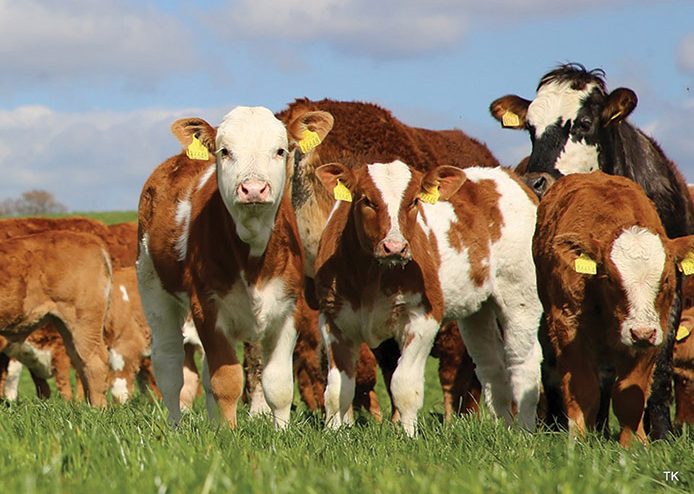
One of Ireland’s largest suckler cow herds has undergone a complete revamp. We spoke to John Kingham, manager of the Tateetra & Rathmore Farms in Co. Louth, about his ambitions for the farm and his plans to bring suckler farming back into vogue.
If recent Department of Agriculture figures are anything to go by, suckler farmers will soon be an endangered species in Ireland. A whopping 9,801 suckler farmers have exited the sector since 2010, which represents a decline of almost 13%. Department data also shows that suckler cow numbers have fallen by 118,000 head in the five years from 2012 to 2017, with the bulk of the reduction concentrated in the south.
The beef cow herd hit a high of 1.1 million head in 2012, but fell to 987,000 head by 2017 – an 11% drop. The fall-off in beef cow numbers is not as pronounced when viewed over the longer time frame of 2010 to 2017, with the drop in numbers totalling 76,000 or 7.2%. The latest figures show that the south and south-east have experienced the sharpest falls in beef cow numbers, with the reductions attributed to the high level of dairy conversions in the region.
Determined to buck this trend is John Kingham, who has introduced a completely new commercial herd, including breeding females and pedigrees sires, since he became manager of Tateetra & Rathmore Farms in January 2018. The herd now consists of 500 cows and heifers with their offspring, and 15 outstanding sires, including a couple of prize-winning bulls. AI is also used. Total stock numbers can reach over 1,00 and the herd is grazed on 1,000 acres of fertile farmland across two different holdings which are located close to Dundalk and are owned by Dermot and Derry McKeown of Kilsaran International Ltd.
The vision of the farm is to produce quality, grass-fed cattle and to maintain a profitable and sustainable enterprise.
“There has been a suckler herd here since 1960 and hopefully that tradition will continue for many more years to come,” says John, whose family have a pedigree herd in Culloville on the Monaghan-Armagh border.
“On becoming farm manager, I decided to take a fresh approach and that meant revamping the herd and getting ourselves noticed through social media. My team and I have put in a lot of work, the owners have invested heavily and we’re determined to make it work. We’ve insisted on quality genetics and I personally believe that good commercial cattle will always fetch the best prices. We’re not going down the ‘star’ route, we’re only interested in producing quality cattle.
“It’s sad to see the demise of suckler farming, but I can see it coming back strong again. Rural Ireland needs suckler farmers, but they simply aren’t getting a fair price for their beef at the moment. There isn’t enough being done at Government level to help them.
“Dairy farming is fashionable at the moment and herds are getting bigger and bigger, but I’d fear for the future because of a shortage of quality labour in the sector. You’re bringing in people from non-farming backgrounds and that doesn’t work in my opinion.”
He continues: “Environmentalists are always going on about greenhouse gas emissions and how they need to be reduced which is fine, but instead of talking about how bad and damaging it is what exactly do they want farmers to do? A solution is more welcoming, the list is endless as to what is affecting it, but more time and effort needs to be spent of resolving it, farming is here to stay, it’s a healthy way of life. Suckler farming is a more environmentally-friendly enterprise.”
The working bulls on the Tateetra & Rathmore Farms are a mixture of Charolais, Limousin, Shorthorn, Simmental and Angus. Shorthorns Gilven Guardsman and Creaga NorD were Supreme Champion at the Carlisle Show in May 2015 and Reserve All-Ireland Calf Champion in 2017 respectively. Limousin Ardlea Nemo was overall junior male champion at the Roscrea Show, Semen will be available for purchase from K Genetics later in 2019. While Simmental Seaforce Gill and Charolais Deelview Mogador were purchased from Bova-AI.
Sourced mostly in Ireland, the suckler cows calve between autumn and spring. The oldest of their offspring are now around nine months and John plans on holding his first replacement heifer sale this October. “We’ll be selling 40 or 50 replacement heifers this year and the aim is to increase the numbers to 80 or 90 each year thereafter,” he explains.
“I will decide near weanling time if I run with under 16 month bulls for beef or sell them off.”
The layout of the Tateetra & Rathmore Farms is all paddock system similar to a dairy farm set-up, the stock is put out to grass in the first week of April and brought in at the end of November, while the services of local agri contractors are utilised, but that’s where the comparisons end. John is delighted to have been given the opportunity to put his own stamp on the farm by Dermot and Derry McKeown, whose father Patrick established it almost 60 years ago. He is also grateful for the support he receives from staff members Niall Maguire from Liatroim, Ciaran Poland from Mayobridge (both Co. Down), Declan Savage from Forkhill, Co. Armagh and John’s partner Hannah McMonagle, who looks after the administration side of things.
“It’s a real team effort here,” he stresses.
By following the Tateetra & Rathmore Farms Facebook page, you will be introduced to the herd sire, cows and calves, breeding females and will also get a glimpse of the work involved in running a large suckler farm in Ireland.
Tateetra & Rathmore Farms
Castletown,
Dundalk,
Co. Louth.
Telephone: 086 167 4960
Taken from Irish Tractor & Agri magazine Vol 7 No 4, August 2019